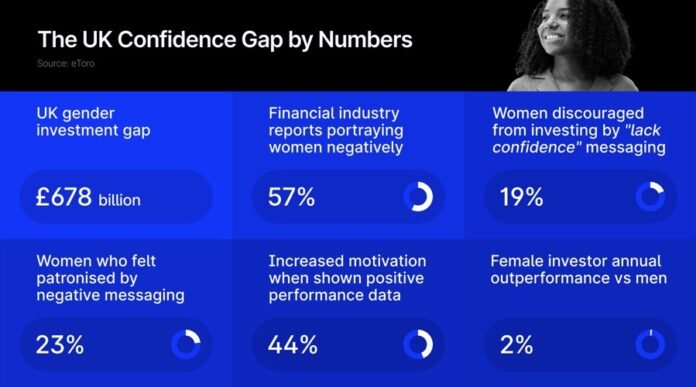The Confidence Myth in Women and Investing
For years, the financial services sector has pointed fingers at a so-called "confidence problem" as the primary reason for the underrepresentation of women in investing. However, recent research from eToro suggests that this narrative is not only misguided but is also exacerbating the issue.
Negative Framing in Financial Messaging
An analysis of over 80 UK reports and campaigns from financial companies between 2020 and 2025 revealed a troubling trend: 57% of these communications depicted women’s confidence in investing negatively. Common phrases such as “too nervous to invest,” “unsure where to start,” and “too scared of losing money” were prevalent. In stark contrast, only 21% of the reports highlighted the strengths women bring to investing, such as patience and a long-term focus.
The language used in these reports matters significantly. A study conducted by eToro and research firm Appinio found that nearly one in five women felt discouraged from investing when told they lacked confidence. Almost a quarter reported feeling patronized, while 17% stated that such messaging drained their motivation to engage with investing.
The Damaging Impact of Negative Narratives
Dan Moczulski, the Managing Director of eToro UK, emphasized the harmful nature of this negative framing. He described it as “an unintentional act of collective self-harm” by an industry that claims to support women and aims to close the gender investment gap. This framing not only misrepresents women’s capabilities but also perpetuates stereotypes that can deter potential investors.
Performance Data Contradicts Stereotypes
Interestingly, multiple studies indicate that female investors often outperform their male counterparts. Research from Warwick Business School in 2018 found that women outperformed men by nearly 2% annually. Their investment strategies, characterized by careful consideration, a tendency to ask questions, and a cautious approach to risk, lead to better financial outcomes.
Moczulski noted, “We don’t need women to invest like men; we need them to invest like themselves.” This statement underscores the importance of recognizing and valuing the unique strengths women bring to the investing landscape. Women tend to trade less frequently and adopt a long-term perspective, behaviors that contribute to superior performance. What the industry often labels as hesitation is, in fact, a manifestation of better judgment.
The Power of Positive Messaging
When the narrative shifts to a more positive framing, the response from women changes dramatically. In the same research, when women were presented with the statement “Women investors outperform men by 4%,” 26% of non-investors expressed a desire to learn more about investing. Overall motivation to invest surged by 44%. This demonstrates the significant impact that positive messaging can have on encouraging women to engage with investing.
Representation Matters
However, the issue extends beyond messaging to the representation of women in financial discussions. The eToro research found that 41% of women felt disconnected from those who publicly discuss investing. More than half believed that the conversation is dominated by men, and 54% noted that it is primarily finance professionals who lead these discussions.
An earlier study by eToro highlighted that men account for 75% of screen time in financial media, often portraying women in subordinate roles. This lack of representation can further alienate potential female investors and reinforce the notion that investing is a male-dominated field.
Challenging Gender Stereotypes
Dr. Ylva Baeckström, a Senior Lecturer in Finance at King’s Business School, argues that the industry must change its approach. She stated, “Branding women as underconfident undermines women’s excellent investment abilities.” The perpetuation of negative gender stereotypes is not only powerful but also destructive, contributing to the ongoing gender investment gap.
The Gender Investment Gap
Currently, the gender investment gap in the UK stands at a staggering £678 billion, roughly equivalent to the economy of Switzerland. According to data from Boring Money published with eToro, approximately 3.3 million more men invest than women, and this gap widened by 200,000 individuals in the past year.
Jill Scott’s Advocacy for Change
In an effort to address this gap, eToro has enlisted Jill Scott MBE, the former England footballer, as an ambassador for its Loud Investing campaign. Scott draws parallels between elite sports and investing success, emphasizing the importance of discipline and patience. “You don’t win tournaments overnight; you build towards them over years. It’s the same with investing,” she remarked.
The Loud Investing initiative aims to reshape how the industry discusses female investors and encourages more women to start investing. The campaign advocates for shared knowledge and open conversations about money, rather than recycling outdated stereotypes that have failed to effect meaningful change.
A Call for Transformation
The financial services sector stands at a crossroads. By shifting the narrative from one of negativity to one that celebrates the strengths of female investors, the industry can foster a more inclusive environment. This transformation is not just beneficial for women; it has the potential to enrich the investing landscape as a whole.

